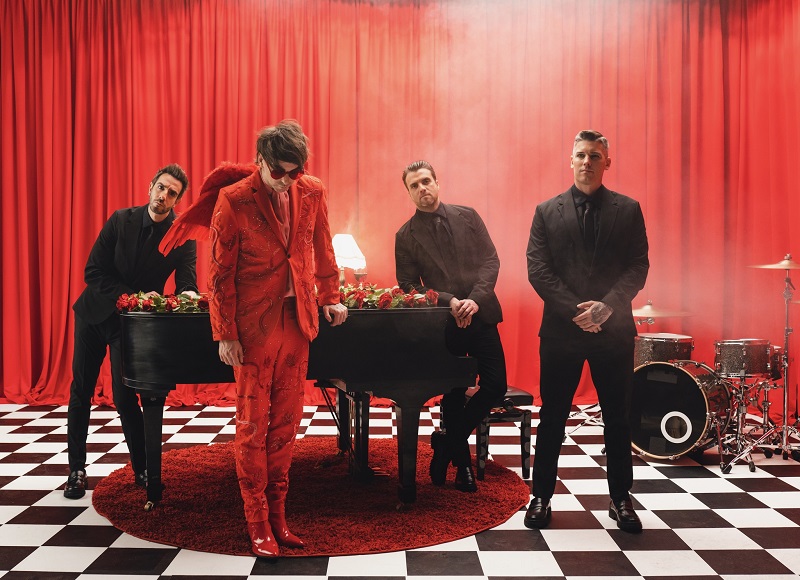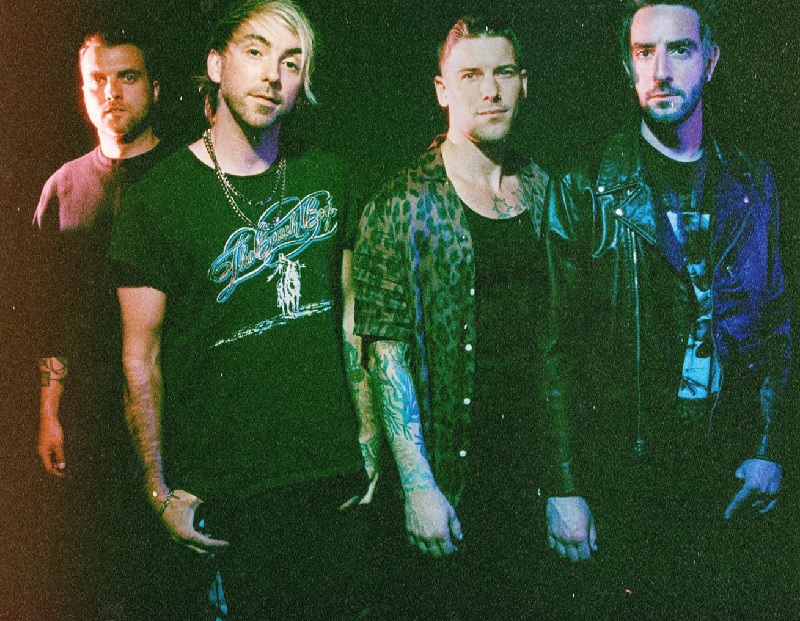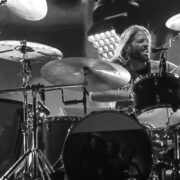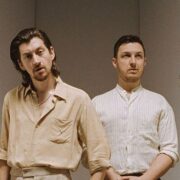Foto di copertina: Ashley Osborne
Si ringrazia Maria Chiara Cerra per la collaborazione
Il 2023, per gli All Time Low, significa due cose: vent’anni di carriera e un nuovo album in studio. “Tell Me I’m Alive” vuole porci un interessante quesito: dopo un periodo di solitudine, com’è possibile tornare a sentirsi vivi? In occasione della loro data al Fabrique di Milano, abbiamo avuto la possibilità di chiederlo direttamente a Alex Gaskarth e Jack Barakat.
– SCROLL DOWN FOR THE ENGLISH VERSION –
Ciao e bentornati su SpazioRock! Come va?
Alex: Molto bene, è davvero bello essere qui. È passato un po’ di tempo dall’ultima volta che siamo venuti qui, perciò è davvero fantastico essere tornati. È una sensazione parecchio entusiasmante, dopo essere stati rinchiusi in casa senza poter viaggiare più di tanto.
Jack: Non abbiamo mai avuto un brutto concerto, qui. Non c’è mai stato un concerto in cui il pubblico fosse calmo e rilassato, sono sempre tutti scatenati.
Siete qui al Fabrique di Milano per l’unica data italiana del vostro tour, quindi, prima di tutto, il tour come sta andando?
Alex: Finora è stato fantastico. L’energia è incredibile, si nota davvero che non siamo stati in giro per più di due anni. Penso che il pubblico sia sempre stato molto coinvolto ed entusiasta, i concerti stanno facendo il tutto esaurito. Si vede che c’è un grande entusiasmo per un concerto degli All Time Low, il che è fantastico, perché noi siamo entusiasti di suonare.
C’è anche il vostro nuovo album, “Tell Me I’m Alive”, in uscita il 17 marzo. Perché avete scelto questo titolo per il disco e qual è il messaggio che con esso volete dare ai vostri fan?
Alex: Il disco in sé riflette molto su alcuni dei periodi più bui che abbiamo appena attraversato collettivamente: le cose per un po’ si sono fatte molto serie. Il nostro ultimo disco, “Wake Up Sunshine”, è uscito proprio nel picco della pandemia, ma non l’abbiamo scritto a riguardo. Mentre invece, non direi affatto che questo disco parla della pandemia, però è sicuramente visto attraverso le lenti di chi ha appena attraversato quegli anni. Quindi penso che abbia molto a che fare con il metabolizzare e l’affrontare concetti quali alienazione, solitudine e come poter superare queste cose. “Tell Me I’m Alive” è proprio una sorta di chiamata all’azione, del tipo: “Dopo tutto quello che abbiamo passato, ho bisogno di essere scosso e riportato in vita, di ritrovare uno scopo, di trovare un significato in questo nuovo mondo.” E credo che la stessa title track parli, in un certo senso, dell’idea che vogliamo che la gente sia disposta a tutto per questo, capisci cosa intendo? E la fine di quel brano in particolare è stato un buon modo per presentare l’album e per definirne l’atmosfera.
Da un punto di vista musicale, sembra che si rifaccia di più al synth-pop rispetto ai vostri lavori precedenti. C’è una qualche ispirazione o influenza particolare per questo sound?
Alex: Allora, direi che molto è derivato da quello che abbiamo realizzato in “Last Young Renegade”. Penso che all’epoca quello fosse stato, per noi, una sorta di disco sperimentale — ci siamo spinti a fare cose diverse e l’album si appoggiava fortemente al synth-pop e cose del genere, e quindi penso che con quel disco la sperimentazione si senta. Non era ancora un obiettivo del tutto raggiunto, mentre stavolta penso che abbiamo preso quello che ci piaceva di “Wake Up Sunshine” e quello che ci piaceva di “Last Young Renegade”, fondendo assieme queste due cose per cercare di creare questo nuovo mondo. Perciò, credo che il sound si sia formato in alcuni dei nostri vecchi lavori. E poi, stranamente, ora con Dan [Swank, turnista, ndr] abbiamo un pianista sul palco, il che ci ha consentito di mettere nel disco cose che non eravamo stati in grado di fare prima — ora sappiamo che possiamo ricrearle in live.
Andando più nel dettaglio, avete già pubblicato qualche singolo: “Sleepwalking”, “Tell Me I’m Alive” e infine “Modern Love”, che peraltro è uscita nel giorno di San Valentino. Non è esattamente una storia felice e romantica, però…
Alex: No, non esattamente [ride, ndr]. “Modern Love” è una canzone in cui il protagonista lotta con il concetto di amore “da favola” o “da film”, con questa versione idealizzata dell’amore e con ciò che l’amore in realtà è. Vuole averlo disperatamente, ma poi viene colpito in faccia dal fatto che quella non è la vita vera.
Jack: Aspettative irrealistiche.
Alex: Sì, esatto. E più o meno si rende conto che l’amore è una cosa diversa, che nel mondo reale è tutto un altro tipo di patto, e il brano vede questi due mondi scontrarsi.
Pensate che l’amore “moderno”, come avete detto nel brano, sia davvero “troppo complicato” rispetto a quello che era in passato? E se sì, perché?
Alex: Penso che se lo paragoni a ciò che vedi sul grande schermo – che è l’intenzione della canzone – allora sì. Penso che la persona nella canzone voglia solo quel momento in cui ci si scontra per mano in un ristorante, si dice “oh!” e poi si è già innamorati per sempre.
Quindi un amore “a prima vista”?
Alex: Già. Ed è tipo niente lavoro, niente responsabilità. Solo che le cose non stanno davvero così.
Jack: Mi piace pensare che uscire con qualcuno negli anni ‘80 o ‘90 fosse più facile, ma ne dubito. Ho la sensazione che guardiamo al passato pensando “oh, probabilmente era così facile allora!”, ma con tutta probabilità era altrettanto difficile.
Quindi pensi che, in qualsiasi epoca, ci siano dei lati positivi e dei lati negativi.
Jack: Sì, sicuramente.
Alex: Ma non c’è dubbio che, ancora una volta, questo discorso si inserisca nel contesto del disco e anche nel mondo attuale. Perché ovviamente, avendo appena attraversato questo periodo di isolamento, posso immaginare come sia, per una persona single, uscire dalla pandemia pensando “Vorrei davvero incontrare qualcuno” e poi “Ho dimenticato come si parla con le persone!”, hai presente?
Dev’essere stato davvero difficile, dopo due anni di isolamento.
Alex: Già, esatto.

A proposito di amore, da un punto di vista dei testi, sembra che ci sia una sorta di “trama” in tal senso: prima ci sono brani come “Tell Me I’m Alive”, che danno l’idea del tenersi stretti a una persona amata durante i periodi difficili, ma poi ci sono brani come “I’d Be Fine If I Never Saw You Again” o “Kill Ur Vibe” che sembrano indicare l’esatto opposto…
Alex: Sì, questa è un’ottima osservazione. Cioè, c’è sicuramente un filo conduttore e “I’d Be Fine” per me è una canzone che parla di vizi e di cose a cui ti leghi per sentirti più a tuo agio e più… come si dice? Tipo, più “vivo”. Ma queste cose, alla fine, non sono sempre ciò che è giusto per te.
Jack: Non è troppo lontano da una cosa simile a “Monsters”.
Alex: Già. E poi, in realtà, direi che è un po’ una sorta di “canzone sorella”, in tal senso, di Modern Love, e che è una specie di risposta a quest’ultima?… Quasi come dire a te stesso “Sto andando avanti! Sono a posto, non ho bisogno di te! Ma ora mi sento solo, che faccio?”. Kill Ur Vibe parla proprio di questo — è un po’ come quando sei a terra, in un momento di depressione, guardi quelle persone che sono sempre in grado di sorridere e pensi: “Non so come facciate a mantenere tutto sotto controllo”, “Qual è il vostro trucco? Come fate a essere così bravi?”. È stata una sorta di esplorazione di questo aspetto.
C’è anche “English Blood, American Heartache”, che è un titolo molto interessante perché tu, Alex, sei nato in Inghilterra, ma ti sei trasferito negli Stati Uniti in tenera età.
Alex (rivolgendosi a Jack): Davvero?
Jack: Già.
Alex: Ah, figo! [ride, ndr] No, davvero.
Per un attimo mi avete quasi fregata. Quando si tratta di influenze musicali, credi che il tuo Paese d’origine ti abbia ispirato in qualche modo oppure, a questo punto, ti senti completamente americano?
Alex: Mi sento piuttosto americano, perché mi sono trasferito in America quando avevo sette anni. Ma ho sicuramente mantenuto i miei legami con il Regno Unito. Ho passato molto tempo a tornare lì, e lì abbiamo fatto una marea di concerti, perciò ho avuto modo di trascorrervi molto tempo con la band. E poi, sai, sono cresciuto con la musica britannica.
Jack: Mi hai fatto conoscere tantissimi artisti britannici di cui nemmeno sapevo nulla.
Potresti farci degli esempi?
Jack: Voglio dire, non avevo mai ascoltato nulla dei Beatles. Cioè, sapevo chi fossero, ma lui mi ha fatto ascoltare la loro musica e io ho pensato “Oh, è davvero roba forte.” Forse è la migliore band del mondo! [ride, ndr]
Alex: [ride, ndr] Nei miei primi anni di crescita, i miei genitori ascoltavano sempre artisti britannici come Bowie e gli Oasis e i Blur e tutto il britpop anni ‘80 e ‘90, lo ascoltavano di continuo. Quindi è come se quella musica fosse disseminata da qualche parte nella mia mente. Anche se, una volta che mi sono trasferito in America, forse non lo è più stata come prima, è comunque sempre rimasta presente.
Dunque si tratta più di un’influenza del tuo background culturale, ma non di un’influenza che vorresti mettere nella tua musica.
Alex: Sì. A dire il vero, penso che in seguito io mi ci sia riavvicinato. Molto di questo disco è influenzato dai Beatles — mi sono immerso di nuovo nella musica dei Beatles e ho ascoltato molto del loro repertorio. Penso che alcune di quelle sonorità emergano in qualche canzone, nel disco: ci sono momenti in “Calm Down” e persino “Modern Love” o “The Sound Of Letting Go” in cui gli elementi di piano e gli archi e le chitarre sembrano influenzati da musica più vecchia.
Questa è una cosa davvero interessante! Per concludere, vi aspettano molti spettacoli interessanti, tra cui qualche concerto acustico nel Regno Unito, una diretta streaming del vostro concerto alla Wembley Arena e il When We Were Young Festival in autunno. Quale fra questi vi entusiasma di più?
Jack: Bella domanda!
Alex: Cioè, quello che ci entusiasma di più è il fatto che, ogni volta che abbiamo annunciato qualcosa del genere, è andato sold out in un attimo. E quindi, ogni volta che succede, sai che lì ci sarà proprio un’energia palpabile. Non vedo l’ora di suonare in ognuno di questi concerti; non so se ce n’è uno in particolare che ti indicherei, sono semplicemente molto carico.
Jack: È una bella sensazione quando il disco non è nemmeno ancora uscito e le persone vi si sentono già legate, capisci cosa intendo? Questo è sempre proprio il nostro piano e la nostra speranza, e quindi avere tutta questa roba che vende così bene è, in un certo senso, indicativo del fatto che alla gente piace ciò che facciamo.
Il When We Were Young in particolare è una novità nel mondo dei festival, ma il suo successo l’anno scorso è stato enorme. Perché pensate che così tanti giovani si stiano avvicinando all’emo e al pop-punk, al giorno d’oggi. Secondo voi, in che modo questa scena riesce a rimanere attuale?
Alex: È una bella domanda. È buffo, perché per molto tempo non è stata molto attuale. Penso che, per buona parte della nostra carriera, ci siamo dovuti scontrare… Be’, non scontrare, ma siamo andati un po’ controcorrente rispetto a ciò che era popolare. Quando siamo cresciuti intorno al 2002-2003, ascoltavamo noi stessi quel genere ed era davvero popolare, era su MTV e quant’altro. E poi ha avuto una sorta di calo proprio quando la nostra band stava iniziando a decollare!
Jack: in ambito mainstream.
Alex: In ambito mainstream — quindi, tipo, dal 2009 al 2016, probabilmente. Non so quale sia la ragione di questo ritorno, ma adoro che la gente sia scoprendo la musica che noi amiamo da quando avevamo dodici anni, quindi è una bella cosa e sta rendendo le nostre vite molto più interessanti ed entusiasmanti.
Perché poi voi siete una band da vent’anni, giusto?
Alex: Da vent’anni, sì. E ovviamente supportiamo questa cosa in toto, è davvero divertente. Sai, ci sono così tante band in quel festival che per un po’ si sono sciolte e con cui in passato siamo stati in tour, ed è fantastico che potremo suonare di nuovo con loro.
Jack: Penso sia un momento molto figo per la musica, perché penso che, sebbene all’inizio molto di questo revival fosse attribuito alla nostalgia e alla gente che desiderava e rivisitava ciò che quel momento aveva rappresentato per loro, in realtà ha ispirato un sacco di nuova musica davvero bella. Penso che ne siano usciti dei giovani artisti fantastici — non è più solo “oddio, i Fall Out Boy!”, “oddio, i My Chemical Romance!”. Sono delle grandi band, quindi non le sto screditando, o come anche noi che siamo in giro da un po’, ma è davvero figo vedere artisti come i Games We Play e Lauran Hibberd – che sono influenzati da alcuni di quei momenti e alcuni di quei sound – emergere adesso e fare le loro cose, perché stanno dando una spinta all’intero genere, il che è meraviglioso.
Fantastico! Questa era l’ultima domanda, grazie mille per il vostro tempo.
Alex: Va bene, grazie a te!
Jack: Grazie, belle domande!
– ENGLISH VERSION –
Hello and welcome back to SpazioRock! How are you doing?
Alex: Really good, it’s great to be here. It’s been a little while since we’ve been here, so it’s really, really nice to be back. It feels very exciting, just having been cooped up and not having been able to travel as much, so it’s awesome.
Jack: We’ve never had a bad show here. There’s never been a show where the crowd is mellow and chill, like, everyone’s always wild.
You guys are here at Fabrique in Milan for the only Italian date of your tour — so first of all, how’s the tour going?
Alex: it’s been great so far. The energy’s been amazing, it’s really noticeable that we haven’t been in over two years up for awhile. I think all the crowds have been really engaged and really excited, and the shows are selling out… you know, you can tell there’s just a lot of excitement for an All Time Low show, which feels great, ‘cause we’re excited to be playing.
And also, you have your new album, “Tell Me I’m Alive”, coming out on March 17th. Why did you choose this title for the record — and what is the message that you want to give to your fans with it?
Alex: Well, the record itself is very reflective on some of the darker times that we’ve all just been through collectively as people and, you know, things got heavy for awhile. Our last record, “Wake Up Sunshine”, came out right in the peak of the pandemic — but you know, we didn’t write it about it. Whereas, I wouldn’t say that this record is about the pandemic at all, but it’s definitely through the lenses of having just gone through those years. So I think there’s a lot of, like, processing, and a lot of dealing with concepts like alienation and loneliness, and how you get through those things. “Tell Me I’m Alive” is really, kind of this call to action, like, “I need to be shaken back to life after all we’ve just been through and find purpose again, and find meaning in this new world”. And I think that song itself is sort of about, like, the idea that we wanna make people run through a brick wall, you know what I mean? And with the end of that song in particular — it was a good way to introduce the album and setting it up.
Musically speaking, it feels like it’s rather synth-pop inspired compared to your previous records. Is there some particular inspiration or influence for this kind of sound?
Jack: with “Tell me I’m Alive” in general, the album?
Yeah.
Alex: I mean, I would say that a lot of that came from what we sort of accomplished from “Last Young Renegade”. I think that “Last Young Renegade” was, at the time, kind of an experimental record for us — like, we sort of branched out into different things and that one leaned heavily into synth-pop and some of that stuff, and so I think with that one you can hear the experimentation on it. It’s not like a fully realised thing yet, whereas I think this time around we took what we loved about “Wake Up Sunshine” and what we loved so much about “Last Young Renegade” and kind of smashed those two things together to try and create this world. So I think it was kind of formed by some of our older music. And weirdly, now we have a piano player on stage with Dan, and that opened the door to being able to put stuff on the record that we hadn’t been able to do before — now we know that we could recreate it live.
Going further into details, you already released a few singles — “Sleepwalking”, “Tell Me I’m Alive” and lastly “Modern Love”, which was released on Valentine’s Day, actually. It isn’t quite the blissful, romantic story, though, is it?
Alex: Not exactly, no [laughs]. “Modern Love” is kind of a song about this character who is wrestling with the concept of, like, fairytale love? Movie-screen love? And this idealised version of romance and what love is. They want that so badly, but they’re sort of getting hit in the face by the fact that that’s not real life.
Jack: Unrealistic expectations.
Alex: yeah, exactly. And it sort of, it dawning down on them that it’s, like, that it’s different, that it’s all a different bargain in the real world, and just kind of those two worlds colliding.
Do you think that modern love, like you said in the song, really is “too complicated” compared to what it used to be in the past — and if so, how so?
Alex: I think if you’re comparing it to what you see on the silver screen – which is what the intention of the song is – yes. You know I think it’s like, the person in the song just wants that moment when you bump hands in a restaurant and then you’re “oh!” and then you’re in love forever.
Like, love at first sight?
Alex: Yeah. And it’s like, no work, no responsibility, and it’s like — that’s just not the case.
Jack: I like to think that dating back in the 80s or 90s was easier, but I doubt it. I feel like we probably look back at it like “oh, it was probably so much easier back then!” but it was probably just as hard.
So you think that, whatever the era might be, there are positive and negative sides to it.
Jack: Yeah, for sure.
Alex: but there’s no doubt that — again, it sort of fits in the context of the record and in the world now as well, because obviously, having just gone through these years, like isolation and, you know, I imagine what it must be like for a single person coming out of the pandemic and being like, “I really wanna meet someone” and then like, “I forgot how to talk to people!“. Do you know what I mean?
It must be so hard, after two years of isolation.
Alex: Exactly, yeah.

Lyrically, talking about love, it seems like there is some sort of storyline in that sense?… Because firstly you’ve got songs like “Tell Me I’m Alive” that feel a bit like holding on to a loved one during tough times, but then you’ve also got songs like “I’d Be Fine If I Never Saw You Again” or “Kill Ur Vibe” that seem to indicate the complete opposite…
Alex: Yeah, this is a great point. I mean, there are definitely through-lines and, you know, “I’d Be Fine” for me is a song about vices and about things that you sort of bind yourself to, to make yourself feel more comfortable and more… what’s the word? Like, more “alive”. But those things aren’t always ultimately what’s good for you.
Jack: Not too far off from, like, a “Monsters” type of thing.
Alex: Yeah. And then I’d would say that it’s actually kind of, like, it’s a little bit of a “sister song”, in that way, to “Modern Love”, and that it’s kind of the answer to it? Almost where it’s like, you’re sort of telling yourself, “I’m moving on! I’m good, I don’t need you! But now I feel alone, what do I do?”. “Kill Your Vibe” is really about — it’s a little bit of like, when you’re in a down place and depressive place, looking at people that are able to put on a smile all the time and go, “I don’t know how you keep it together”, “what is your trick? How are you so good at this?”. That was kind of an exploration into that.
There is also “English Blood, American Heartache” that’s a very interesting title — because you, Alex, were actually born in England, but then moved to the US at an early age.
Alex (to Jack): you were?
Jack: uhm-uhm.
Alex: oh, cool! [laughs] No, I was.
You had me for a second. When it comes down to music influences, do you feel like your country of origin inspired you in some ways or do you feel completely American in that sense?
Alex: I feel pretty American, ‘cause I moved to the States when I was 7. But I’ve definitely kept my British ties there. I’ve always spent my time going back there and we’ve played a ton of shows there, so I’ve got to spend a lot of time going back with the band. And, you, know, I grew up with British music.
Jack: You showed me so much different British artists that I didn’t even know anything about.
Could you tell us some examples?
Jack: I mean, I didn’t even play anything that was by the Beatles — I knew who they were, I mean, but he’s actually, like, we’d listen to that stuff and I was like “oh, that’s actually pretty good.” Maybe it’s the best band in the world! [laughs]
Alex: [laughs] In my former years growing up, my parents were always listening to British artists like Bowie and Oasis and Blur and all of that 80s and 90s britpop, like, it was always on. So it’s kind of like, that was maybe peppered in the back of my mind — even though, once I moved to the States, maybe it wasn’t as much as before, but it’s kind of always been in there.
So it’s something like a background influence, but not an influence that you want to put into your actual music.
Alex: Yeah. To be honest I think as of later, I’ve kind of come back around to it. Like, a lot of this record is informed by — I actually went back into, like, a deep dive on the Beatles again and listened to a lot of their catalogue. I think some of that sound kinda comes through some of these ones on this record. There are moments in, like, “Calm Down” and even “Modern Love” or “The Sound Of Letting Go” where the piano influences and the string sections and guitar moments that just feel informed by older music.
That’s really interesting! Lastly, you’ve got loads of interesting shows ahead, like some acoustic gigs gigs in the UK, a livestream of your show at Wembley Arena and the When We Were Young Festival in autumn. Which one are you most excited for?
Jack: phew, good question!
Alex: I mean, what we are most excited about is just that every time we’ve announced something like that it’s sold out in a second. And so it’s like, anytime that happens, you just know there’s gonna be a really palpable energy there. It makes me really look forward to each show. I don’t know if I have one that I’d pinpoint specifically, but I’m just kinda really hyped up.
Jack: it feels good when it feels like, the record’s not even out yet and people are already connecting to the record, you know what I mean? That’s really the plan, and that’s always, like, the hope, and so having all that stuff selling really well is kind of indicative that people are enjoying what we’re putting out, which is […].
When we Were Young in particular is a novelty in the festival scene, but its success last year was massive. Why do you think that so many young people are approaching emo and pop-punk nowadays — and how, in your opinion, does this scene manage to stay relevant?
Alex: it’s a good question. It’s funny, because for a long time it was not really relevant. I think that, for a bulk of our career, we’ve been fighting against kind of — well, not fighting, but kinda going against the grain with what’s popular. When we grew up in 2002-2003, we’d listen to it ourselves and it was really popular, it was on MTV and everything. And then it kinda had a dip right when our band started to kind of, you know, take off!
Jack: in the mainstream sense of it.
Alex: in the mainstream sense of it — so, like, 2009 to probably 2016, really. I don’t know what the reason for it is, but I love that people are discovering this music that we’ve been in love with since we were 12, so it’s really fine and it’s making our lives are lot more interesting and exciting.
‘Cause you’ve been a band for 20 years now, right?
Alex: 20 years, yeah. And we obviously fully support it, it’s so fun. You know, there’s so many bands at that festival that have been broken up that we used to tour with, and it’s so cool that we’re getting to play with them again.
Jack: I think it’s a really cool moment for music, because I think, even though a lot of the beginning of this were predicated on nostalgia and sort of people longing for what that moment in time was and revisiting it, it’s actually inspired a lot of really cool new music. I think there’s been some great young new artists that have come out of it — not just being like “oh my god, Fall Out Boy!”, “oh my god, My Chemical Romance!”. You know, they’re great bands, so no discredit to them, or to a band like us, that’s been around for awhile, but like, it’s really cool to see artists like Games We Play and Lauran Hibberd – influenced by some of those moments and some of those sounds – coming out now and doing their thing, because it’s kind of pushing the whole genre forward, which is awesome.
Alright! This was the last question, thank you so much for your time.
Alex: Nice, thank you!
Jack: Thank you, great questions!








